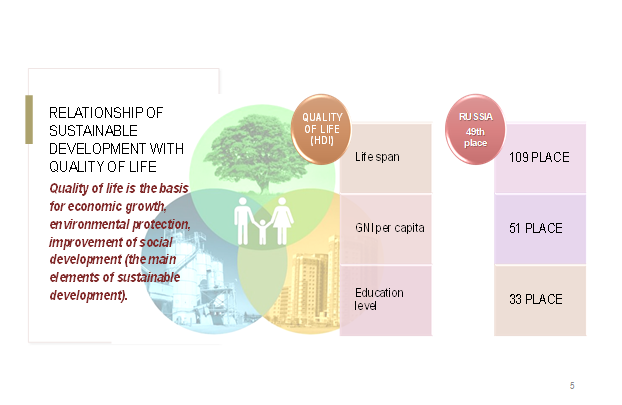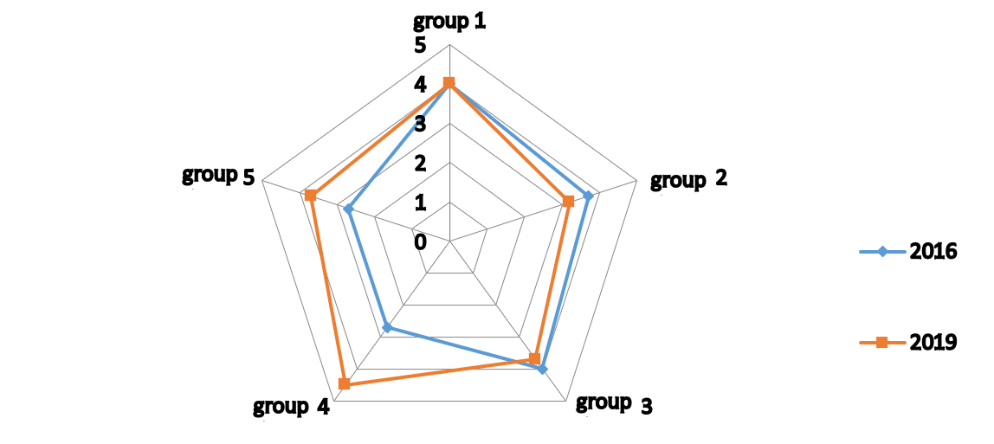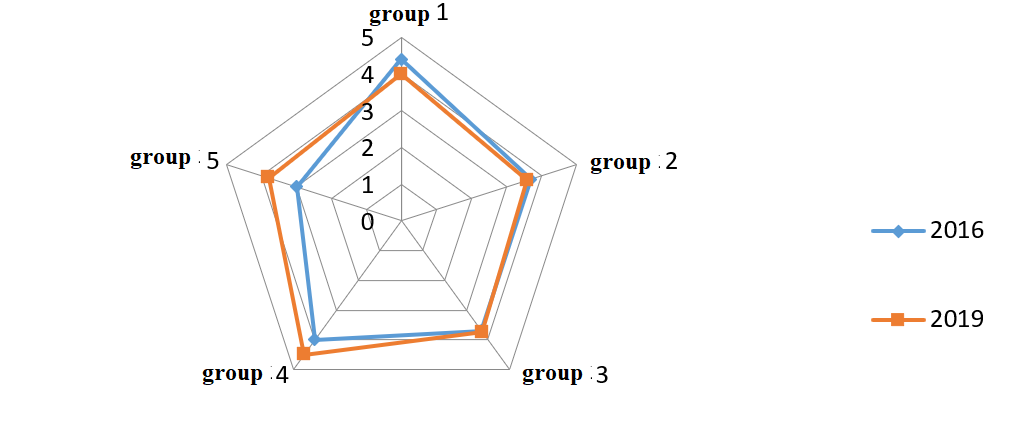Abstract
The key role of education in achieving the 17 sustainable development goals identified by the UN for the period up to 2030 as the most important factors in transforming the world is considered. At the same time, improving the quality of education stimulates the development of the knowledge economy branches, that provides decisive competitive advantages in modern socio-economic processes. The authors show the choice of public priorities on the example of the development and implementation of the Strategy for the economic and social development of St. Petersburg for the period up to 2035. One of the most important priorities is the development of education to ensure sustainable development of the city's economy, increase the competitiveness of St. Petersburg in Russia and on foreign markets through the purposeful formation and accumulation of intellectual capital. A comparative analysis of the state of the knowledge economy branches in Russia and a number of other countries is presented, the activities of the UNESCO Chair "Quality Management in Education for Sustainable Development" at Peter the Great St. Petersburg Polytechnic University on conducting research in accordance with the global goals of UNESCO and Russia's national priorities in the field of improving the quality of education are shown.
Keywords: Quality, knowledge economy, sustainable development
Introduction
The concept of "sustainability of life» was introduced into scientific circulation for the first time by the outstanding Russian scientist Academician Vladimir Vernadsky (Okrepilov, 2013). In 1926, almost a century ago, he formulated three main criteria for the sustainability of life:
- preservation and development of the biosphere due to the sustainability of ecological systems;
- achieving the irreversibility of economic growth;
- social development of a person armed with scientific knowledge.
The scientific foresight of Academician V. I. Vernadsky is now embodied in the harmonious concept of the sustainable development designed by modern scientists. It was approved by the international community as a compulsory program of action and agreed by 193 UN member states.
In the final document "Transforming our world: the 2030 Agenda for Sustainable Development", adopted in 2015 at the 70th session of the UN General Assembly (Transforming Our World: The 2030 Agenda for Sustainable Development, 2015), 17 sustainable development goals were identified, the achievement of which can ensure stable progress of mankind in the coming years. Quality education occupies one of the leading positions in the hierarchy of these interrelated goals.
The focus on the qualitative characteristics of activities is the most important condition for sustainable development. It is quality that is the core for economic growth, environmental protection and improvement of the social sphere, which constitute the triad of the main directions of sustainable development and improvement of the life quality.
In turn, in accordance with the criteria adopted by the UN, the main three indicators of the quality of life are life expectancy, the standard of living determined by the gross national income (GNI) per capita, and the achieved level of education. They collectively define the Human Development Index (HDI).
Problem Statement
According to 2019 UN data, Russia ranks 49th in the list of countries in HDI. At the same time, if in terms of life expectancy, it is in 109th place, and in terms of GNI per capita - in 51st, then in terms of education, Russia's position is noticeably higher - 33rd place (Figure 1).
The position, frankly speaking, is not a leading one, but it creates opportunities for the qualitative growth of the education sector in Russia and the development of the knowledge economy, which increasingly determines the position of countries in the world socio-economic competition. Human knowledge and the ability to apply it in practice form the main economic resource - "human capital". American sociologist, founder of the concept of post-industrial society D. Bell, was one of the first to define such a direction of social development. (Bell, 2004). This position was developed by the American economist, Nobel Prize laureate Michael Spence, who emphasized that the new economy requires a qualitatively different human capital, and the key factors in this process are education, investment in R&D and urbanization. (Spence, 2013).

However, to date, as academician Aganbegyan (2018) noted, there is a serious lag in our country in the development of the knowledge economy from the leading countries. It must be overcome as soon as possible.
To improve the quality of "human capital", regular investments in its maintenance and development are important. Moreover, not only the share of such expenditures in GDP is significant, but also the effectiveness of these investments. According to 2019 data, the share of R&D in Russia's GDP was 1.2%, education - 4%, healthcare and biotechnology - about 5%, information and communication technologies - 4% As a result, the share of the knowledge economy in the Russian GDP was 14%. Table 1 shows comparisons of the share of individual industries and the knowledge economy as a whole in the GDP of Russia, China, Western Europe, and the USA.
The outstripping development of industries that form the knowledge economy was the most important priority in the development of the Strategy for the economic and social development of St. Petersburg for the period up to 2030, and subsequently - when adopting the revised Strategy until 2035. This approach in many respects made it possible to ensure higher rates of development of St. Petersburg in comparison with the average and other regions in Russia during a difficult period of economic downturn and recession. The share of the knowledge economy in the gross product of our city is significantly higher than the national indicators and amounts to 25%.
Research Questions
The task of St. Petersburg is to reach higher levels in this indicator, since in the leading European countries the share of the knowledge economy in GDP has already reached 30%, in the USA it has exceeded 40%. The knowledge economy should remain a competitive advantage of St. Petersburg in the short and long term - this is the goal of the City Development Strategy until 2035. The Strategy-2035 directly states: "The development of the education sector is an important condition for ensuring the sustainable development of St. Petersburg, increasing its competitiveness in the formation and accumulation of intellectual capital." (Strategy of social and economic development of St. Petersburg for the period up to 2035, 2020, p. 6.1).
The knowledge economy education occupies a special, basic position. At the international level, modern requirements for the quality of education were formulated in the Action, Framework “Education 2030” which calls for the provision of inclusive and equitable quality education and the promotion of lifelong learning opportunities for all. This program was approved by all participating countries in 2015 at the World Education Forum organized by UNESCO in Incheon, Republic of Korea (Transforming Our World: The 2030 Agenda for Sustainable Development, 2015).
In the Declaration adopted at the World Forum, all participating countries, including Russia, committed themselves to “provide quality education and improve learning outcomes, which requires increase of costs, higher efficiency of learning processes and strengthening of results assessment, as well as the existence of mechanisms which will evaluate the progress achieved".
One of the fruitful initiatives of UNESCO in the field of education has been the creation of specialized chairs at universities in 126 countries. Such departments dominate in the exchange of experience, knowledge and information on the entire range of issues related to higher education, ensure the interaction of Russian universities and research institutions with the global system of educational and scientific cooperation (Nishanyan, 2020).
When creating at the end of 2017 at the Peter the Great St. Petersburg Polytechnic University, the specialized UNESCO Chair “Quality Management in Education for Sustainable Development”, we took into account the obligations of the UNESCO Action Framework “Education 2030”.
The decision to create the department became the recognition by UNESCO of the international significance of the experience accumulated in St. Petersburg in the systematic provision of the quality of education and, at the same time, the great contribution of scientists and teachers of the Polytechnic University to the study of sustainable development and quality of life. The versatility of Peter the Great University, which provides training in a very wide range of specialties, makes it possible, within the framework of one university, uniting 12 institutions, to model options for the implementation of quality education in different areas and test them in practice.
For two and a half years of activity, the UNESCO Chair has been successfully implementing its program guidelines in the implementation of research in accordance with the global goals of UNESCO and the national priorities of Russia in the field of improving the quality of education. This is the subject of the scientific, methodological and organizational work of the staff of the department and other scientists and teachers, who have been invited. Among the most important areas of activity is participation in the development of national standards that ensure sustainable development, in the creation of the integrated interdisciplinary system of managing the quality of education.
Purpose of the Study
In 2019, the basic textbook "Quality Management" was prepared and published, (Okrepilov, 2019). A number of teaching aids, methodological guidelines, work programs and practical assignments were issued for many academic disciplines. They contribute to improving the quality of education for sustainable development.
The work of the Chair is integrated into the global system of activities of UNESCO Chairs, which is represented in Russia at 67 universities. The cooperation of UNESCO Chairs working in the three leading universities of St. Petersburg is particularly close. This interaction is synchronized in the work plans of the departments during joint conferences and research in the field of training of specialists on quality.
The Chairs begin to deal with issues of teaching quality problems from school. First of all, the Chair of the A.I. Herzen Russian State Pedagogical University pays attention to it. At the State University of Aerospace Instrumentation (SUAI) in March 2020, a creative space of a new type of collective work "Boiling Point" was opened, where schoolchildren with the participation of business representatives, scientists, university teachers, graduate students and students began to discuss ways of developing innovations in technological processes, in education, in the social sphere.
Interactive meetings with schoolchildren - future students at the Peter the Great Polytechnic University have become traditional. The vocational guidance of schoolchildren in the specialty of quality management is taken into account in the preparation of educational and methodological materials. For example, books were published for schoolchildren on mastering the future profession "Recreational standardization" and "Recreational metrology". They reveal in an accessible form the content of the main elements of the quality economy and contain practical tasks. All three universities train specialists on quality; the city also has the Institute for the retraining of such specialists, in which scientists from all three UNESCO Chairs in St. Petersburg take part.
Research Methods
One of the problems that the UNESCO Chair of the Polytechnic University, together with its other divisions, is the study of the adaptation of university graduates in the work place, their capacaties and abilities to put the knowledge gained into practice. In particular, in cooperation with the Union of Industrialists and Entrepreneurs of St. Petersburg, the readiness of employees of enterprises of various industries and sizes to create new technologies (Figure 2) or to improve existing production processes (Figure 3) was studied. The changes over a certain period in the level training of employees according to the specified criteria were assessed (Gorin & Imzalieva, 2019).
The studies covered five different groups of enterprises: 1 - large industrial, 2 - small and medium industrial, 3 - scientific and design, 4 - engineering infrastructure organizations, 5 - education, finance, trade. Competence was assessed on a 5-point scale.


Findings
The study showed that within the period under study, employees of engineering infrastructure, education, finance and trade organizations showed better readiness for innovation and a noticeable improvement in the qualifications of personnel. At the enterprises of industry and science, personnel practically have not improved these capabilities for several years. It draws the attention of the heads of enterprises in these sectors to the need for retraining and advanced training of their employees in the field of innovation.
Of course, future specialists should be interested in innovation as early as possible. Therefore, an important aspect of the department's activity was conducting vocational guidance workshops and conferences with the participation of schoolchildren from St. Petersburg and other cities. The idea of education as a special value in the formation of a personality and its successful self-realization in the interests of sustainable development of their city, region, country is established at these events.
Conclusion
The implementation of the idea of the dominant role of education and scientific knowledge, in accordance with the concept of noonomy, is capable of changing and humanizing the sphere of material production, stimulating the development of the entire complex of social relations. (Bodrunov, 2018).
Sustainable development is successfully ensured where the accumulation of knowledge is not a goal in itself, where the quality education is the engine of economic and social progress. The goal of our work is to make this engine run at full speed in our country.
References
Aganbegyan, A. G. (2018). On the priorities of social policy. Publishing house "Delo" RANEPA.
Bell, D. (2004). The Coming Post-Industrial Society: The Experience of Social Forecasting. Publishing house "Academia".
Bodrunov, S. D. (2018). Noonomics. Cultural revolution.
Gorin, E. A., & Imzalieva, M. R. (2019). Education system and industrial adaptation: digitalization and management. Bulletin of Science and Practice, 5(1), 393-404.
Nishanyan, I. (2020). Quality of life in the context of achieving the sustainable development goals of the United Nations and UNESCO. Quality of Life: An Interdisciplinary Approach, 22-27.
Okrepilov, V. V. (2013). The teachings of V.I. Vernadsky about the noosphere - the scientific basis of sustainable development programs. Modern productive forces, 2, 173-81.
Okrepilov, V. V. (2019). Quality management. Publishing house Polytech-Press.
Spence, M. (2013). Next Convergence: The Future of Economic Growth in a World at Different Speeds. Gaidar Institute.
Strategy of social and economic development of St. Petersburg for the period up to 2035. (2020). http://docs.cntd.ru/document/551979680
Transforming Our World: The 2030 Agenda for Sustainable Development. (2015). Resolution adopted by the UN General Assembly on September 25, 2015. https://unctad.org/meetings/en/SessionalDocuments/ares70d1_ru.pdf
Copyright information

This work is licensed under a Creative Commons Attribution-NonCommercial-NoDerivatives 4.0 International License.
About this article
Publication Date
25 September 2021
Article Doi
eBook ISBN
978-1-80296-115-7
Publisher
European Publisher
Volume
116
Print ISBN (optional)
-
Edition Number
1st Edition
Pages
1-2895
Subjects
Economics, social trends, sustainability, modern society, behavioural sciences, education
Cite this article as:
Okrepilov, V. V., Glukhov, V. V., & Gorin, E. A. (2021). Improving The Quality Of Education - A Strategic Framework For Sustainable Development. In I. V. Kovalev, A. A. Voroshilova, & A. S. Budagov (Eds.), Economic and Social Trends for Sustainability of Modern Society (ICEST-II 2021), vol 116. European Proceedings of Social and Behavioural Sciences (pp. 2099-2105). European Publisher. https://doi.org/10.15405/epsbs.2021.09.02.236

